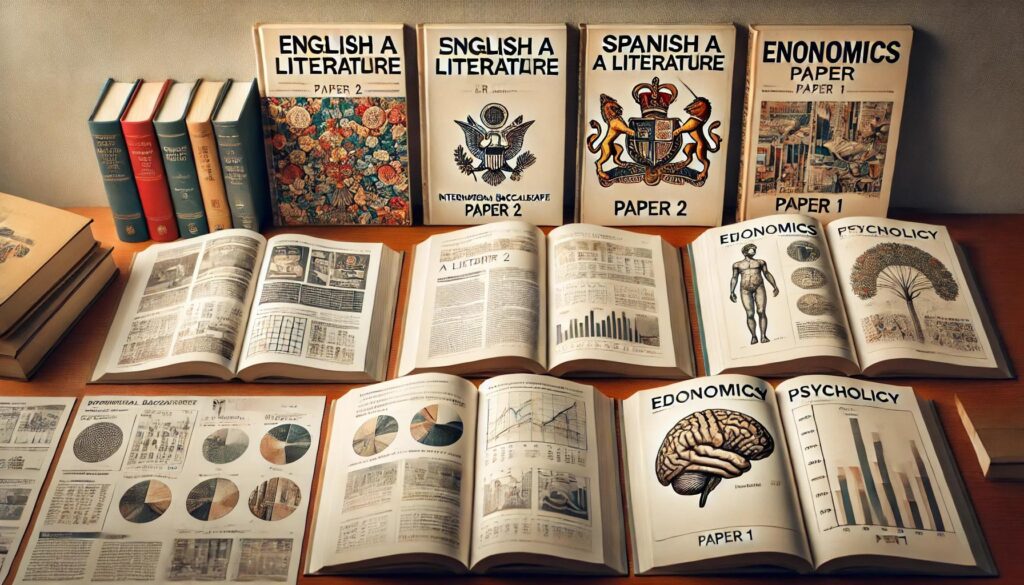
Discover how open book exams in IB can enhance your learning and test-taking skills for academic success.
Curious about the latest developments in the International Baccalaureate (IB) exams? Let’s explore the IB’s Open Book Exam (OBE) pilot for the Diploma Programme (DP)! Although OBEs are not new to the IB, this initiative tests the impact of allowing specific resources in exams within an international setting. Through this approach, the IB aims to assess if OBEs enhance students’ ability to showcase analytical and critical thinking skills.
Background

The IB has long used reference aids in select DP exams, such as data booklets in DP Chemistry. Now, through a multi-year study, the IB is exploring the effects of OBEs across various subjects. This study tests three different types of OBEs, which vary depending on the subject and resources allowed. By analyzing the impact of these formats, the IB aims to create an assessment structure that better mirrors real-world problem-solving.
What is an Open Book Exam?

Simply put, an OBE lets students bring approved materials into the exam room. An OBE is a situation where students use permitted resources to complete an assessment, such as a data or formula booklet, School textbook or dictionary, Book (e.g., a literary or philosophical work), Approved summaries, Student notes, Websites, etc. The purpose is to support application and analysis over memorization, focusing on students’ ability to think critically and use resources effectively.
How Do Students Benefit from an Open Book Exam?

OBEs allow students to access essential details, quotes, and data during the exam, reducing the pressure to memorize facts. This structure encourages questions that focus on analysis, synthesis, and deeper understanding, promoting skills that are relevant beyond the classroom.
Pilot Study: Subjects and Resources
The pilot study focuses on high-stakes summative exams across select subjects. Here’s a closer look at each subject’s exam format and allowed resources:

| Subjects | Rules | Restrictions |
| English A Literature, Spanish A Literature, and Chinese A Literature (Paper 2) | For this pilot, students can bring highlighted copies of three literary works studied during the course into the exam, with the following guidelines: Allowed Markings: Students can use underlining, highlighting, and bookmarks (e.g., post-it notes, paperclips) to navigate key parts of each work. Customization: They may use varied colors and sizes of highlights and bookmarks, but no written words, symbols, or keys are allowed anywhere in the text. Purpose: Marked copies help students find evidence efficiently during the exam, reducing the need to recall exact detail | Format: Only printed copies are permitted, as digital devices are not allowed in the exam room. Edition Limitations: Copies must exclude critical commentary, explanatory notes, bilingual editions, or any supporting material. Guidance Document: Schools will receive additional instructions on allowable editions and handling digital copies and annotations. |
| Economics (Paper 1) | For this pilot, students can create their own booklet to use during the exam with the following guidelines: Purpose: The booklet helps students by summarizing real-world examples that demonstrate course theories and concepts, reducing the need to recall details during the exam. Template and Format: Students will follow a provided template. Allowed content: Up to two A4 pages, handwritten or typed (max 1200 words). Summarize each example in 60 words or less. Summaries may be in text, mind-maps, or a mix (e.g., written on one side, mind-map on the other). | Only factual descriptions of real-world examples; no definitions, explanations, analysis, or evaluations. No visuals (e.g., tables, diagrams), or text formatting (e.g., underlining, bold, italics) are allowed. |
| Psychology (Paper 1) | For this pilot, students can use a teacher-generated booklet with key details of psychological studies covered in DP Psychology, structured to support exam responses without needing to recall all study specifics. Purpose: Provides key study details to aid application in exams. Template and Content: Follows a teacher-provided template, organized by the course’s three approaches (Biological, Cognitive, and Sociocultural). Includes researcher names, publication dates, topic area, study aims, and findings. Limited to two A4 pages, single-spaced, 11-point font, 1200 words max. Formatting and Style:30-word limit per study, two lines per summary. Students receive a clean copy of this booklet to use in the exam. | No bold, underline, color, or varied fonts; visuals are not allowed. |
Collaboration and Study Design
The IB Education Office is working with 270 IB schools globally to study OBE impacts on learning and teaching. The study includes pilot and control schools. Students in pilot schools take exams with allowed resources. Students in control schools continue with closed-book exams. Both groups complete the same exam papers, allowing a comparison of performance and experience.
Benefits of the Open Book Exam Approach

This shift to open-book testing provides several potential benefits:
- Focus on Critical Thinking: OBEs encourage students to prioritize analysis, critical thinking, and problem-solving over rote memorization, aligning well with the IB’s mission to cultivate lifelong learners.
- Real-World Application: With OBEs, students use resources in ways they might in professional or academic settings, practicing how to synthesize information and apply theories in real-time.
- Reduced Exam Stress: Having access to reference materials can alleviate some of the anxiety around memorization, allowing students to focus on demonstrating their understanding.
Exam Format and Future Potential

The IB is piloting open-book exams (OBE) to assess their impact on the entire school community, using two groups: a pilot group and a control group. In the pilot group, selected schools offer OBE for one exam component in each pilot subject, while control schools continue with traditional closed-book exams (CBE). Participating schools were confirmed in June 2023 through a Memorandum of Collaboration.
Who Takes OBEs? Only students in pilot schools registered for a specific subject and exam component will take it in the OBE format, while all other students will follow the CBE format. Teachers in pilot schools will prepare students for OBEs from November 2023 to November 2025, while control group teachers will follow the CBE guidelines.
Marking and Grading– All students, both in pilot and control groups, sit for the same exam paper. However, only pilot students use permitted resources, which are not submitted with the exam for grading. IB examiners will assess pilot and control exams equally, ensuring no bias between OBE and CBE formats. Results for both groups will be released simultaneously.
Role of Pilot and Control Schools– Data from both pilot and control schools will inform future guidance on OBEs. Both groups are required to complete surveys, with pilot participants also receiving specific OBE support materials. Feedback from these surveys will cover student learning, classroom dynamics, exam experience, and the impact on school policies.
The study will focus on comparing pilot and control groups across:
- School policies, resources, and practices
- Student engagement, learning experiences, and well-being
- Teacher experiences, including benefits and challenges
Timeline
| Date | Details |
| January 2025 | Issue of Results for all candidates in the November 2024 session |
| April 2025 | Pre-exam survey for the May 2025 session |
| May 2025 | Issue of Results for all Candidates in the May 2025 Session |
| July 2025 | Issue of Results for all candidates in the May 2025 session |
| November 2025 | Last OBE resit opportunity for May 2025 exam candidates |
Teacher Support
IB pilot schools have received guidance documents outlining OBE conditions, including permitted resources. While extensive training isn’t provided, teachers have additional materials to support skill-building for OBEs.
Final Thoughts

The IB’s OBE pilot program represents an exciting evolution in assessment philosophy, offering students a chance to engage with exams in a way that values critical thinking and application. With these allowed resources, students can demonstrate their analytical skills in a more meaningful way, turning exams into an assessment of synthesis rather than mere recall.
If you’re preparing for an IB OBE and looking for guidance, consider Young Scholarz! We specialize in providing expert support for IB students, offering personalized guidance on skills, concept mastery, literature analysis, and exam preparation. For updates and study tips, follow us on Instagram: @youngscholarz.





